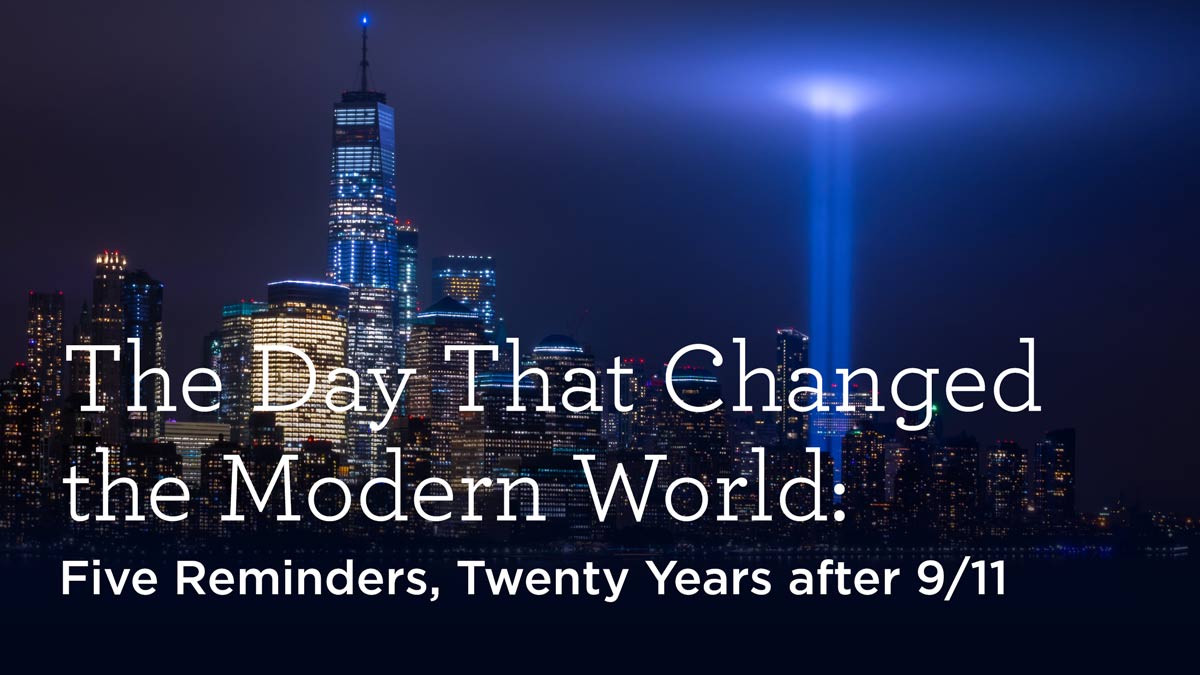
Who among us could have imagined that the World Trade Center towers, those symbols of prosperity and freedom, could so quickly be reduced to rubble and dust against the blue-sky beauty of a Manhattan morning? Who would have thought that planes meant to carry families to Grandma’s house or businesspeople to their next venture could be turned into weapons of mass destruction?
Twenty years ago, the planes hit. Twenty years ago, the towers fell. Twenty years ago, America and the world were changed forever.
Now, twenty years later, those images and experiences we vowed to “never forget” feel more like history than memory to many. The world seems to have moved on. Innovations like cell phones and social media, only budding in the early 2000s, seemingly run our everyday lives. Though we saw great destruction and horror in 2001, few of us could have imagined the generation-defining pandemic that began to spread across the globe in 2020.
But as we face so many new challenges, five reminders that were necessary in the wake of September 11, 2001, remain just as needful and poignant for us today.
1. Life Is Undeniably Fragile
How quickly life evaporates before our eyes! Psalm 49:12 tells us that “people, despite their wealth, do not endure” (NIV). Those hijacked aircraft revealed the fact that whether you are in a first-class leather seat or are packed into coach, whether you are an executive or a janitor, life is fragile. COVID-19 has reminded us of this again twenty years on. We can fool ourselves into thinking we are secure for a time, but our place in this world always hangs by a thread.
2. Death Does Not Discriminate
Death is an equalizer. Scripture reminds us that “all flesh is like grass”—that is to say, on the brink of withering, browning, fading (1 Peter 1:24, emphasis added). Whether someone loses his or her life in a raging inferno or succumbs quietly to a virus in a hospital bed, death is never far from any of us.
We can fool ourselves into thinking we are secure for a time, but our place in this world always hangs by a thread.
3. Human Beings Are Inexcusably Bad
The Bible tells us plainly that “none is righteous, no, not one” (Rom. 3:10). The terrorist and the stay-at-home mom are both born into the same predicament: each needs to be reconciled to a holy, righteous God. It’s true that not all consequences of sin are equal, but we are all guilty of great evil. We can kill with our tongues. We have all tasted hate and deceit. We may not murder people with assault rifles or airplanes, but we are not as unlike the bin Ladens of our world as we like to think. And yet there is still hope for all.
4. Grace Is Necessary
After 9/11, Americans were quick to say, “Never again!” While we haven’t experienced another attack on that scale, we also clearly haven’t put an end to calamity and death. Can we honestly say we live in a better world today than we did twenty years ago? In some ways, perhaps the answer is yes; in other ways, it’s certainly no. We cannot fix a broken world, because we cannot fix the broken hearts that live in it. We cannot climb the steep slope up to God. Instead, God must come down to us, into the frailty of our lives and the reality of our impending deaths. He must step into the depravity of our circumstances as an act of supreme grace.
5. There Is Security in Christ
And as a result of that grace, we can find the security for which our souls long. Terrorists can tear lives away. Viruses can upend whole societies. But in it all, if “we have been justified by faith, we have peace with God through our Lord Jesus Christ” (Rom. 5:1, emphasis added). Scripture assures us that “he who calls you is faithful” (1 Thess. 5:24), and “he who raised Christ Jesus from the dead will also give life to your mortal bodies” (Rom. 8:11).
We cannot climb the steep slope up to God. Instead, God must come down to us, into the frailty of our lives and the reality of our impending deaths. He must step into the depravity of our circumstances as an act of supreme grace.
Twenty years ago, the smoke and ash eventually began to clear. Blue skies prevailed again. But a heaviness went with us. Today, we may face different causes, but we see the same effects and ought to learn the same lesson: we needed God then, and we need Him now. Instead of turning away from Him in grief, walking further into hopelessness, may we come to the only one who offers refuge from every kind of turmoil.
Portions of this article were adapted from the sermon “The Day That Changed the Modern World” by Alistair Begg.
Topics: Articles
